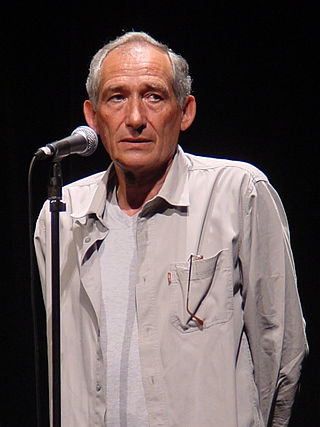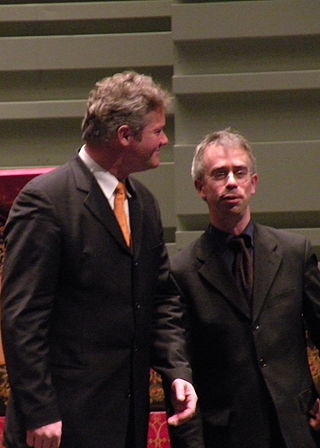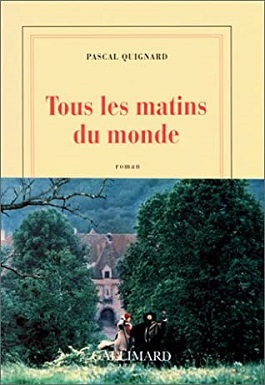
Pascal Quignard is a French writer born in Verneuil-sur-Avre, Eure. In 2002 his novel Les Ombres errantes won the Prix Goncourt, France's top literary prize. Terrasse à Rome, received the French Academy prize in 2000. In 1980 Carus had been awarded the Prix des Critiques. He also won the 2023 Prix Formentor.

Marin Marais was a French composer and viol player. He studied composition with Jean-Baptiste Lully, often conducting his operas, and with master of the bass viol Monsieur de Sainte-Colombe for six months. In 1676 he was hired as a musician to the royal court of Versailles and was successful there, being appointed in 1679 as ordinaire de la chambre du roy pour la viole, a title he kept until 1725.

Jordi Savall i Bernadet is a Spanish conductor, composer and viol player. He has been one of the major figures in the field of Western early music since the 1970s, largely responsible for popularizing the viol family of instruments in contemporary performance and recording. As a historian of early music his repertoire features everything from medieval, Renaissance and Baroque through to the Classical and Romantic periods. He has incorporated non-western musical traditions in his work; including African vernacular music for a documentary on slavery.
Sainte-Colombe may refer to the following places in France:

Guillaume Jean Maxime Antoine Depardieu was a French actor, winner of a César Award, and the oldest child of Gérard Depardieu.
Jean (?) de Sainte-Colombe (c. 1640 – c. 1700) was a French composer and violist. He was a celebrated master of the viola da gamba and was credited (by Jean Rousseau in his Traité de la viole (1687)) with adding the seventh string, tuned to the note AA (A1 in scientific pitch notation), on the bass viol.
Sonnerie de Sainte-Geneviève du Mont de Paris, "The Bells of St. Genevieve" in English, is a work by Marin Marais written in 1723 for viol, violin and harpsichord with basso continuo. It can be considered a passacaglia or a chaconne, with a repeating D, F, E bass line. It is perhaps Marais' most famous composition that explores the various techniques of the viol, an instrument he studied as a student of Monsieur de Sainte-Colombe.

Alain Corneau was a French film director and writer.

Jean-Pierre Marielle was a French actor. He appeared in more than a hundred films in which he played very diverse roles, from a banal citizen, to a World War II hero, to a compromised spy, to a has-been actor, to his portrayal of Jacques Saunière in The Da Vinci Code. He was well known for his distinctive cavernous voice, which is often imitated by French humorists who considered him to be archetypical of the French gentleman.

Pierre Hantaï is a French harpsichordist and conductor.
The Ensemble À Deux Violes Esgales, stylized on their website as A 2 Violes Esgales, was formed in 1984 by the gambists Sylvia Abramowicz and Jonathan Dunford. The group has recorded a dozen albums mostly for Accord, Universal Music France. Based in Paris they tour the world with varied programs from recitals to a larger group with singers.
The 15th César Awards ceremony, presented by the Académie des Arts et Techniques du Cinéma, honoured the best French films of 1989 and took place on 4 March 1990 at the Théâtre des Champs-Élysées in Paris. The ceremony was chaired by Kirk Douglas and hosted by Ève Ruggiéri. Too Beautiful for You won the award for Best Film.
The 17th César Awards ceremony, presented by the Académie des Arts et Techniques du Cinéma, honoured the best French films of 1991 and took place on 22 February 1992 at the Palais des Congrès in Paris. The ceremony was chaired by Michèle Morgan and hosted by Frédéric Mitterrand. Tous les matins du monde won the award for Best Film.

All the World's Mornings is a 1991 novel by Pascal Quignard. It is a story of the apprenticeship of Marin Marais in the house of the austere, reclusive and mysterious violist, Monsieur de Sainte-Colombe, obsessed with his late wife, and of his romantic entanglements with his master's two daughters, Madeleine and Toinette. The story is taken from an anecdote in the work of Evrard Titon du Tillet. Among the historical facts that the book outlines are Sainte-Colombe's addition of the viola da gamba's seventh and lowest string.

Anne Brochet is a French actress.
Rolf Lislevand, is a Norwegian performer of Early music specialising on lute, vihuela, baroque guitar and theorbo.
Mauricio Buraglia is a Colombian composer, recording-artist, musician-lutenist and theorbist of Italian descent, active in Paris, France.

Jonathan Dunford is an American violist specialising in the baroque repertoire.
Jérôme Hantaï is a viola da gamba player and fortepianist.

Caroline Silhol is a French actress and writer. She is a three-time Molière Award-nominee for her theatre performances.












